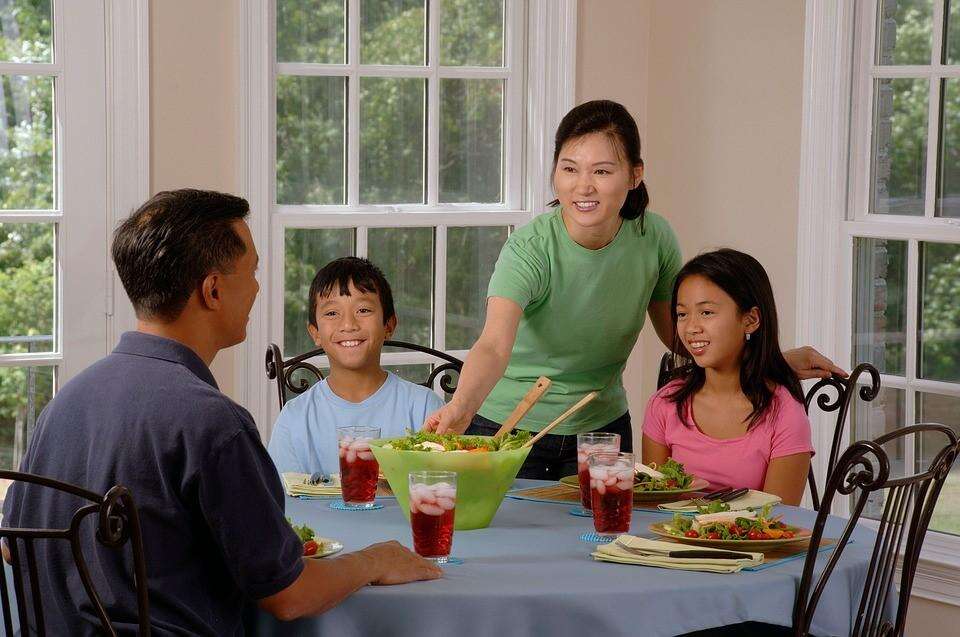The Importance Of Family Meals And Why They Are Important For Children


We have all heard the adage ‘a family that eats together, stays together’. Given the hectic lifestyle of times we live in; family meals have never been as significant as they are today. Be it breakfast, lunch or dinner, coming together to eat as a family does a lot more that making sure everyone has food in their tummies.
For a lot of families today, meal time is the only time when they can come together and interact as a unit. Family meals, thus, go a long way in strengthening family bonds and improving quality of communication between family members.
Why Family Meals Are Important, Especially for Children
Kids have school and you have work and social commitments. Between soccer practices and PowerPoint presentation, the entire concept of quality family time – pillow fights or just smushing under a blanket – dies a quiet death.
Something as simple as having at least one meal a day together as family is all it takes to keep that sense of belonging between family members alive and brimming. Whenever you can, make it point to choose eating with your family at the dining table over eating out of a box, on the go, as the benefits of a family meal are just far too many to overlook.
For starters, family meals have been associated with healthy eating habits. A study carried out in 2007 (http://www.ncbi.nlm.nih.gov/pubmed/17761227) established that families who ate dinner together every day consumed more fruit and vegetables than families who did not eat dinner together. The same study also indicated that families who ate together had comparatively higher levels of nutrients such as calcium, vitamins B6, B12, C and E, dietary fiber, iron and folate.
Families that eat together are known to have stronger bonds. Eating meals together also provides children with better sense of socialization and togetherness. Meal times are a great opportunity for family members to share thoughts, information, fears and apprehensions with each other, thus providing for a well-rounded sense of family support, which is especially crucial for children.
Eating meals together also bridges the communication gap between children and parents or caregivers. Strong communication patterns between parents and children, adolescents in particular, helps in building family ties based on trust and mutual support.
This strong family bond is also associated with lower risk of behavioral problems such as substance abuse, violence and emotional distress.
Research has also pointed that frequency of family meals is directly proportional to motivation levels, positive outlook and commitment to learning among kids and adults alike. Children who grow up in such close-knit environments are more likely to have positive values and self-image.
A 2006 study (http://www.ncbi.nlm.nih.gov/pubmed/16919794) also linked family meals with positive family communication, family support, and increased parental involvement in children’s education.
Another study on similar lines established the unmistakable connection between family meals and positive eating behaviors and lower BMIs between parents and children alike. As eating meals together as a family becomes a norm, take-out meals are replaced with home-cooked ones, which is a great way to tackle to growing incidence of morbid obesity both among adults and children.
Listening to how each member’s day went, sharing funny incidents or problems with each other, and offering advice or solutions can help alleviate stress on a day-to-day basis.
Family meals are also a great way to introduce new foods, set meal time schedules and offer control portions of food to children, toddlers in particular.
How to Make Meal Time Fun?
The myriad benefits of family meals are definitely a motivation for making some lifestyle changes. However, if you are not having fun, the whole purpose is defeated. Here are a few simple tips to make the most of those family dinners and make sure everyone looks forward to them:
- Turn family meals into an opportunity to let conversations flow. Sit at the table before or after you have finished eating and just chat away.
- Why only just eat together? How about cooking together too? Asking each member to pitch in in preparing the meal by doing whatever little they can do help, can extend the family time spent together.
- Allow each person time to talk and ask them how their day went. Listen patiently to what your kids have to say, letting them know that their inputs are valued and you’d be surprised at how much each member of the family looks forward to this little story-sharing part of the day.
- It is also a great way to increase your awareness levels as a family. Discuss the latest goings-on from around the world, teach your children a thing or two about your area of expertise, ask them about things they are well-versed with such as technology, gadgets or social media, so that you all walk away from that table more informed.
- Make meals more interesting by allowing every member to pick what’s on the menu once a week.
.jpg)
